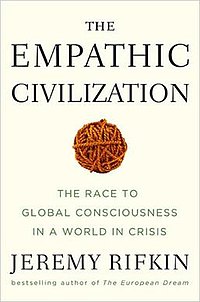The Empathic Civilization
 |
|
| Author | Jeremy Rifkin |
|---|---|
| Language | English |
| Subject | Empathy, civilization |
| Genre | Non-fiction |
| Publisher | Jeremy P. Tarcher Inc. |
|
Publication date
|
2010 |
| Media type | Print (hardcover) |
| Pages | 674 |
| ISBN | |
| OCLC | 426803865 |
The Empathic Civilization: The Race to Global Consciousness in a World in Crisis is a 2010 non-fiction book written by Jeremy Rifkin. It connects the evolution of communication and energy development in civilizations with psychological and economic development in humans. Rifkin considers the latest phase of communication and energy regimes—that of electronic telecommunications and fossil fuel extraction—as bringing people together on the nation-state level based on democratic capitalism, but at the same time creating global problems, like climate change, pandemics, and nuclear proliferation. Rifkin extrapolates the observed trend into the future, predicting that Internet and mobile technology along with small-scale renewable energy commercialization will create an era of distributed capitalism necessary to manage the new energy regime and a heightened global empathy that can help solve global problems.
The book was published by Jeremy P. Tarcher Inc. as a hardcover in January 2010. It was noted as being well-researched and covering a significant breadth of academic fields. However, reviews were mixed; several reviewers found that while Rifkin provided a convincing overview of the development of empathy, he did not provide sufficient proof that increased empathy would necessarily bring people together to co-operatively solve global problems.
Author Jeremy Rifkin had previously written several books that, like The Empathic Civilization, have attempted to extrapolate trends in the economy, technology, and society. For example, his 1995 book The End of Work concerns the changes that tele-commuting would have on the workplace, his 1998 book The Biotech Century concerns the expected impacts of genetic engineering, and his 2002 book The Hydrogen Economy concerns the economic and social effects that will result from the expected replacement of fossil fuels with hydrogen as an energy storage medium. His last book before writing The Empathic Civilization was The European Dream, published in 2004, comparing the American Dream with the values expressed by Europeans in the post-industrial economy. At the time of publication, the 64-year-old Rifkin was working as an advisor to the European Union concerning issues relating to the economy, climate change, and energy security, as well as president of the American non-profit organization the Foundation on Economic Trends. Rifkin argues that the global crisis of 2008 and 2011 marks the end of a particular energy regime – fossil fuels. The new global economy will be based upon renewable energy, like wind power, solar energy, natural gas, etc. He calls this distributed capitalism because these energy sources are dispersed rather than centralized. They are best controlled by individuals or small communities. This will entail a very different power structure from fossil fuel, financial capitalism. This new structure is networked and decentralized, and an inherently much more democratic form of globalization.
...
Wikipedia
